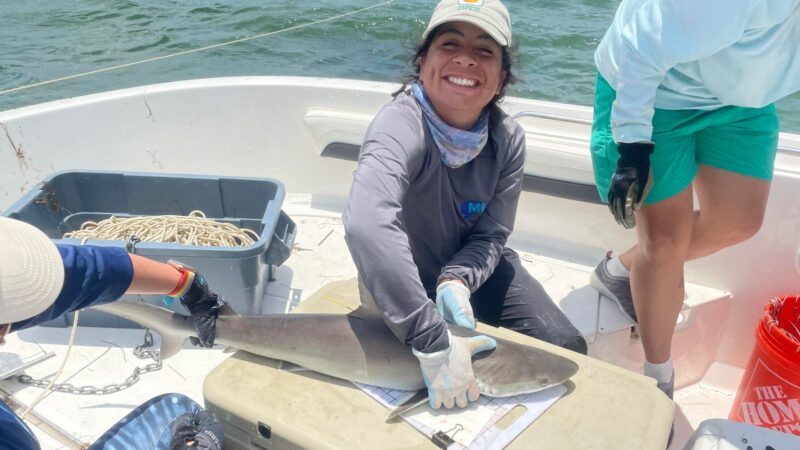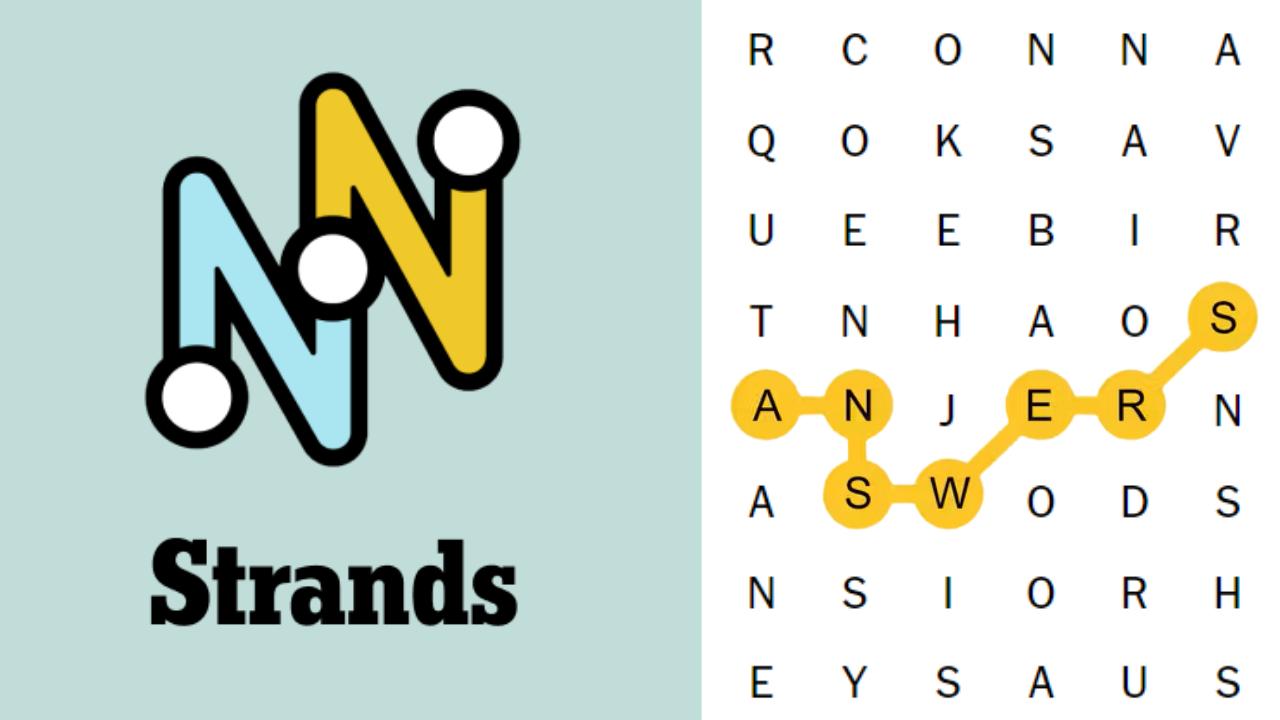Norah is taking blood from a tiger shark to determine their stress levels
2024 SRC
She wasn’t supposed to end up here. At least, not according to the “rules.”
Her degree was in Modern Languages, not biology. She had no lab coat, no early acceptance into graduate school, no wealthy parents or socked away trust fund to bankroll the unpaid internships marine science so often demands. Yet today she is leading shark research projects that stretch from the inland waters of North Carolina to the tourist-laden coasts of Florida — and she’s helping rewrite the future of who gets to be a scientist along the way. “I fell into shark science the way you fall into the ocean,” Norah Mendoza says. “By accident, and then completely headfirst.” That plunge began in Costa Rica, during a junior-year study abroad course in tropical marine biology where one snorkel trip changed everything. Beneath the surface, surrounded by a kaleidoscope of reef life, she knew she had found her calling. “Something just clicked — I suddenly knew what I wanted to spend my life doing.”
But knowing and getting there were two very different things.
Marine science, especially shark research, is infamous for its financial and cultural barriers. Internships that demand months of unpaid labor. Programs that quietly expect students to uproot their lives or pay their way onto research boats. Colleagues who say it’s “laughable” to pursue a marine science career without a science degree. Those barriers would have stopped many. Instead, they lit a fire within Mendoza, scraping together money through odd jobs, working liveaboard gigs as a divemaster in the Florida Keys, leaning into every chance to be on the water. When she couldn’t earn a paycheck, she traded sweat and stubbornness for opportunity — anchoring boats, hauling tanks, reading winds and currents until those skills made her indispensable.
The persistence paid off.
First with coral restoration work at I.CARE in the Keys, then with a position at Minorities in Shark Sciences (MISS), the trailblazing nonprofit amplifying underrepresented voices in marine biology. Today, she is not only part of the MISS team but is spearheading shark research with direct conservation implications. One flagship effort is the North Carolina Bull Shark Project, a MISS-led initiative that asks a deceptively simple question, “How do bull sharks (Carcharhinus leucas) use inland waters as nurseries?” These powerful predators are capable of thriving in both salt and freshwater and are suspected of raising their young in estuaries and rivers… but the details around this early time in their lives remain murky. “North Carolina’s coast, especially Pamlico Sound, is way more important to bull sharks than people used to think. Thanks to Dr. Chuck Bangley’s earlier research, we now know it’s a key nursery area — possibly the northernmost one along the U.S. Atlantic. Before that, most folks thought bull sharks only went as far north as Florida,” Mendoza explains, per the MISS website. “The MISS project builds on that foundation, but what’s really special is how it started: not in a lab, but in the community. Local shark lovers and curious residents wanted to know more about the sharks they were seeing, and that energy helped launch the work. Pages like Encounter NC played a big role — sharing sightings, stories, and questions in a way that made science feel accessible and fun. That kind of grassroots curiosity is what keeps the project grounded and growing.” The project enlists an often-overlooked ally: local fishers, whose daily observations of where sharks appear, how they behave, and when they arrive provide data no satellite tag could replicate. By combining community knowledge with scientific monitoring, the project is building a clearer picture of how bull sharks rely on coastal habitats, and what protections those habitats may need.
Norah is taking blood from a nurse shark to determine their stress levels
2024 SRC
Her independent research is equally urgent but a little more secretive. In Florida, she is studying the impact of shark provisioning (the practice of feeding sharks to attract them for dive tourism). “Shark provisioning is […] common in tourism hotspots like parts of Florida, the Bahamas, South Africa, and Australia, though acceptance varies by place,” she says. While provisioning fuels a multimillion-dollar ecotourism industry, scientists worry it may also alter sharks’ migration patterns or diet in ways that ripple across ecosystems. “Many regions restrict or ban the practice because provisioning can train sharks to associate people or boats with food (increasing human‐shark risk), unnaturally concentrate animals and alter their movements and social behavior, and create conflicts in multi‐use areas where divers, swimmers, and fishers share space.” For now, details of Mendoza’s study sites remain closely guarded to protect the integrity of the work, but the central question is clear: “Are we trading sharks’ natural behaviors for our own entertainment, and what will the long-term costs be?” By combining movement tracking with biological sampling, she is hoping to get a full picture of how provisioning changes shark behavior and health. “Acoustic tags and a discreet receiver array let me see who’s coming, how often they return, and whether individuals spend more time near provisioning sites than they would otherwise. Muscle biopsies let me read diet over time so we can tell how much of a shark’s food is coming from provisioning versus natural hunting. I’m also screening those same samples and doing gentle swabs to check parasite loads and signs of stress, because bringing animals together repeatedly could increase disease or parasite transmission.”
Ultimately, Mendoza hopes this work produces straightforward, usable guidance that keeps sharks and people safer while still allowing local tours and fishers to operate: “I
want to show how small, everyday actions like where, when, and how bait is used, can shift shark behavior, diet, and health, and turn that into practical advice operators can actually use. Rather than blanket bans, the goal is realistic recommendations (timing, site rotation, bait handling, crowd limits) that reduce harm, support healthy shark populations, and keep the wildlife experiences communities depend on.”
The science is rigorous, but she insists research is only half the job. The other half is accessibility. As MISS’s Program Coordinator, she designs programs that crack open the field for people who, like her, once felt locked out. One standout is Diversifying Ocean Sciences, a year-long fellowship that provides free coursework, mentorship, and field training to career changers and students from nontraditional backgrounds. She tells the story of one participant who was a former policy maker, mother of two, and self-described outsider to science. “She’d spent eight years away from science and doubted she belonged. She came in curious but cautious, [loving] the idea of marine work but didn’t see a realistic path that fit family responsibilities,” Mendoza explained. “Through the cohort, targeted workshops, and one‐on‐one mentor conversations she discovered that her policy background was an asset, not a barrier. […] She’s now working in a field she loves while balancing family life, and the program gave her the practical bridges, skills, network, and confidence to make that shift.”
It’s stories like these that keep her grounded. “I want to make sure nobody has to question their place in this work the way I did,” she says because representation, she argues, isn’t just about fairness but about better science. Fishers’ generational knowledge, Latina mothers’ balancing acts, the perspectives of people who’ve come to science late — each brings a way of seeing the ocean that traditional pipelines overlook. “Diversity in scientists leads to diversity in thought, which leads to innovation,” she points out, quoting MISS’s motto. “That’s exactly what we need to tackle messy, real-world conservation challenges.” And she has a message for the next generation of would-be scientists, especially those who feel they don’t fit the mold. “There’s no single ‘right’ background for marine science. Your curiosity and the skills you already have are your ticket in.” Whether it’s policy, teaching, storytelling, or tech, those skills can be assets. Start small. Seek mentors. Build community. And don’t let the gatekeepers decide where you belong.
Her story is proof of that. The field may be slow to change, but like the predators she studies, she’s relentless.








